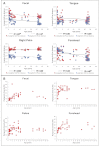Cohabiting family members share microbiota with one another and with their dogs
- PMID: 23599893
- PMCID: PMC3628085
- DOI: 10.7554/eLife.00458
Cohabiting family members share microbiota with one another and with their dogs
Abstract
Human-associated microbial communities vary across individuals: possible contributing factors include (genetic) relatedness, diet, and age. However, our surroundings, including individuals with whom we interact, also likely shape our microbial communities. To quantify this microbial exchange, we surveyed fecal, oral, and skin microbiota from 60 families (spousal units with children, dogs, both, or neither). Household members, particularly couples, shared more of their microbiota than individuals from different households, with stronger effects of co-habitation on skin than oral or fecal microbiota. Dog ownership significantly increased the shared skin microbiota in cohabiting adults, and dog-owning adults shared more 'skin' microbiota with their own dogs than with other dogs. Although the degree to which these shared microbes have a true niche on the human body, vs transient detection after direct contact, is unknown, these results suggest that direct and frequent contact with our cohabitants may significantly shape the composition of our microbial communities. DOI:http://dx.doi.org/10.7554/eLife.00458.001.
Keywords: Human; companion animals; environmental microbial reservoirs; family structure; metagenomics; microbial community transmission.
Conflict of interest statement
The authors declare that no competing interests exist.
Figures





Similar articles
-
Factors associated with dog ownership and contact with dogs in a UK community.BMC Vet Res. 2007 Apr 3;3:5. doi: 10.1186/1746-6148-3-5. BMC Vet Res. 2007. PMID: 17407583 Free PMC article.
-
Interplay of personal, pet, and environmental colonization in households affected by community-associated methicillin-resistant Staphylococcus aureus.J Infect. 2019 Mar;78(3):200-207. doi: 10.1016/j.jinf.2018.11.006. Epub 2018 Nov 29. J Infect. 2019. PMID: 30503843 Free PMC article.
-
Household Transmission of Clostridium difficile to Family Members and Domestic Pets.Infect Control Hosp Epidemiol. 2016 Nov;37(11):1342-1348. doi: 10.1017/ice.2016.178. Infect Control Hosp Epidemiol. 2016. PMID: 27767004
-
Gut microbiota of humans, dogs and cats: current knowledge and future opportunities and challenges.Br J Nutr. 2015 Jan;113 Suppl:S6-17. doi: 10.1017/S0007114514002943. Epub 2014 Nov 21. Br J Nutr. 2015. PMID: 25414978 Review.
-
Dogs' Microbiome From Tip to Toe.Top Companion Anim Med. 2021 Nov;45:100584. doi: 10.1016/j.tcam.2021.100584. Epub 2021 Sep 10. Top Companion Anim Med. 2021. PMID: 34509665 Review.
Cited by
-
Replenishing our defensive microbes.Bioessays. 2013 Sep;35(9):810-7. doi: 10.1002/bies.201300018. Epub 2013 Jul 8. Bioessays. 2013. PMID: 23836415 Free PMC article. Review.
-
The influence of skin microorganisms on cutaneous immunity.Nat Rev Immunol. 2016 May 27;16(6):353-66. doi: 10.1038/nri.2016.48. Nat Rev Immunol. 2016. PMID: 27231051 Review.
-
Comparison of placenta samples with contamination controls does not provide evidence for a distinct placenta microbiota.Microbiome. 2016 Jun 23;4(1):29. doi: 10.1186/s40168-016-0172-3. Microbiome. 2016. PMID: 27338728 Free PMC article.
-
Time to abandon the hygiene hypothesis: new perspectives on allergic disease, the human microbiome, infectious disease prevention and the role of targeted hygiene.Perspect Public Health. 2016 Jul;136(4):213-24. doi: 10.1177/1757913916650225. Perspect Public Health. 2016. PMID: 27354505 Free PMC article.
-
Microbial transmission in animal social networks and the social microbiome.Nat Ecol Evol. 2020 Aug;4(8):1020-1035. doi: 10.1038/s41559-020-1220-8. Epub 2020 Jun 22. Nat Ecol Evol. 2020. PMID: 32572221 Review.
References
-
- Anderson M, Gorley R, Clarke K. 2008. PERMANOVA+ for PRIMER: guide to software and statistical methods. PRIMER-E, Plymouth, UK
-
- Bates D, Maechler M, Dai B. 2008. The lme4 package. http://lme4.r-forge.r-project.org/
Publication types
MeSH terms
Grants and funding
LinkOut - more resources
Full Text Sources
Other Literature Sources
Medical
Molecular Biology Databases

